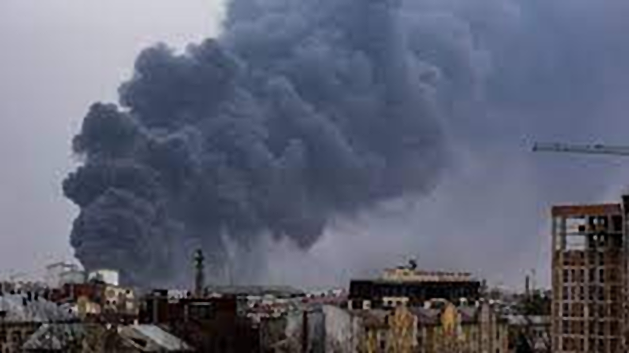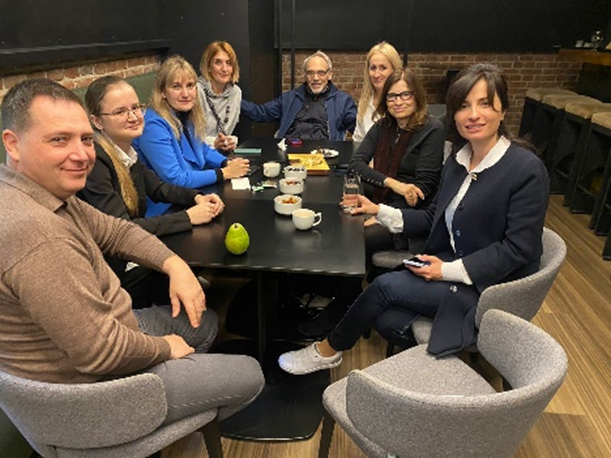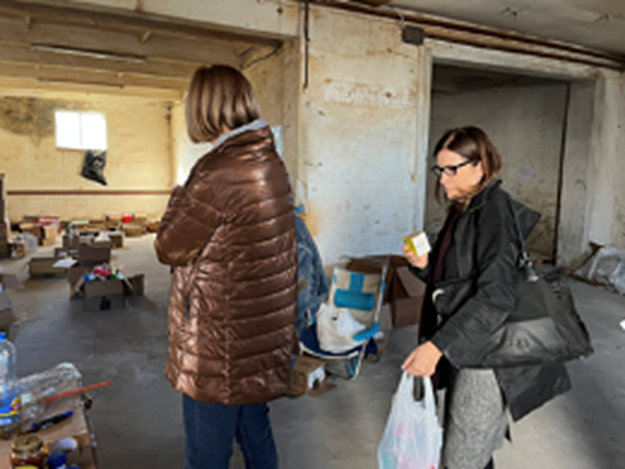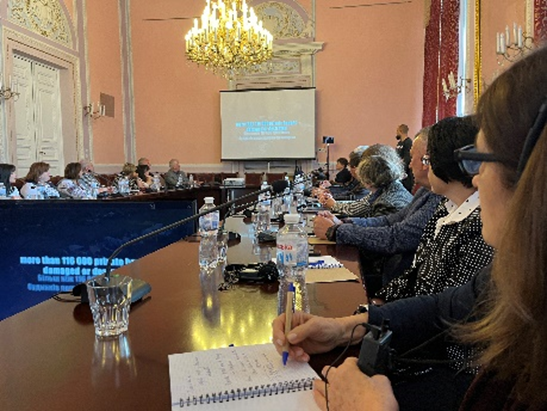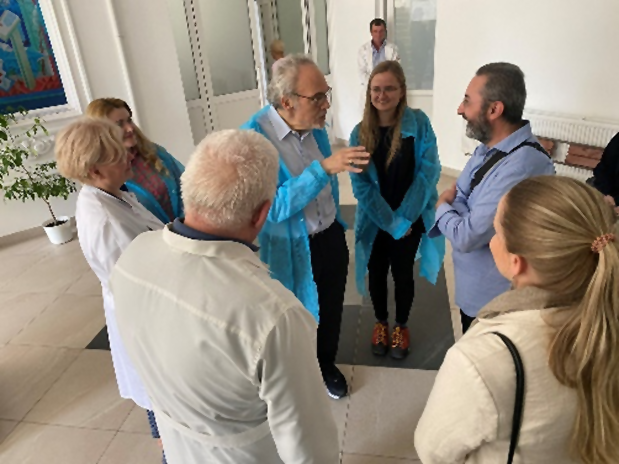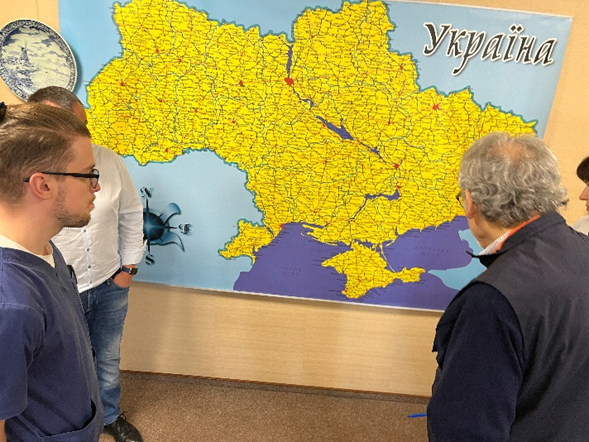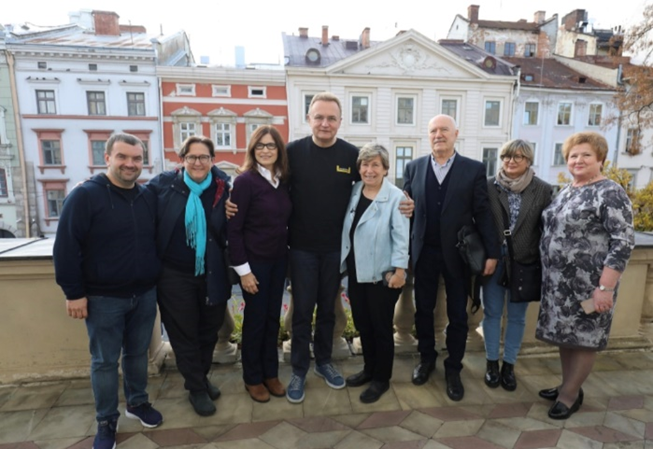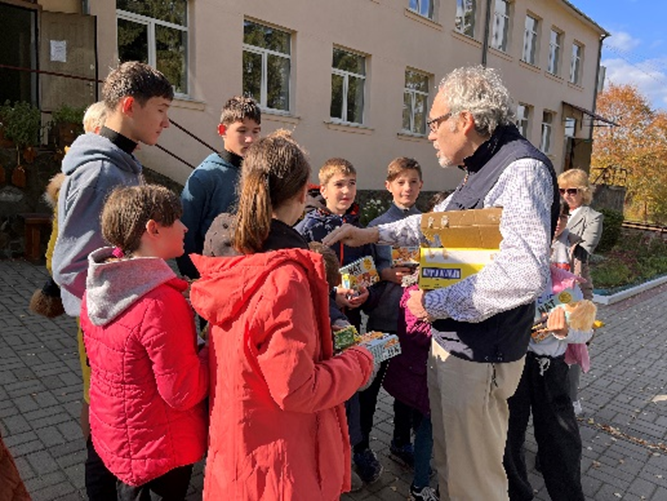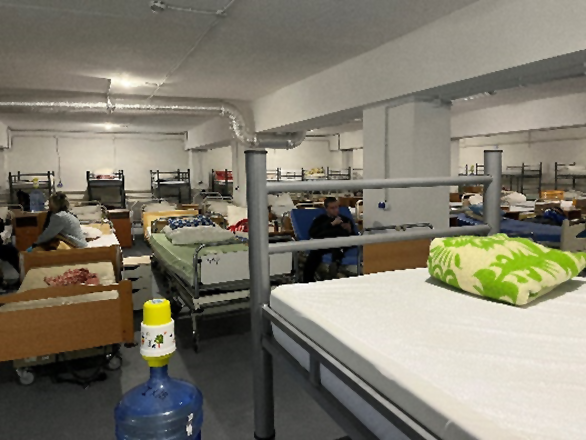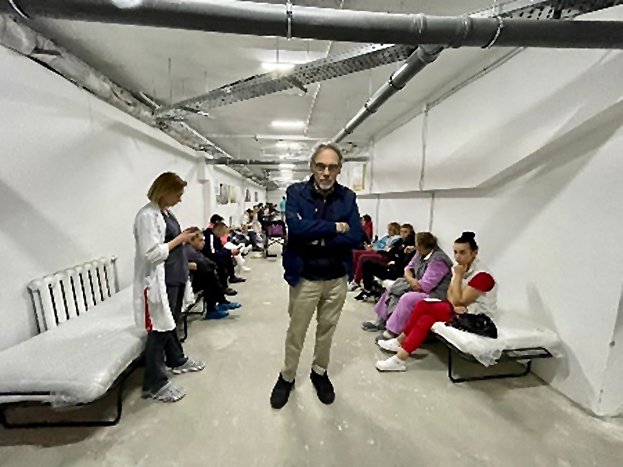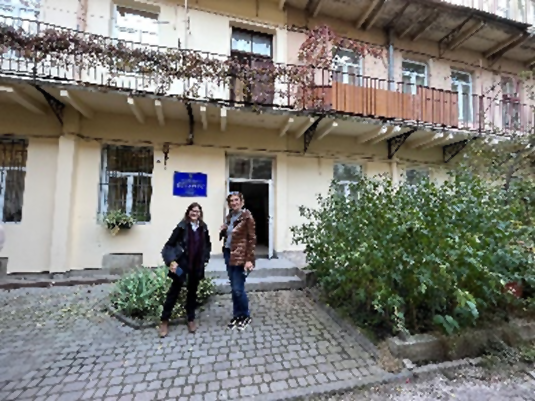Below is an account of my recent visit to Ukraine in October of 2022 for the Ukraine Children’s Action Project (UCAP).
-
We flew into Rzeszow, Poland, picked up by our volunteer team at the airport. Took about an hour and a half to get to the border. Long delays getting to and through the Polish border patrol, then delays through the Ukrainian checkpoint, as well. Late arrival at Bank Hotel (former actual bank built in 1870) in Lviv. about 9 PM by the time we checked in.
-
Woken with a start at about 7:30 AM by air-raid sirens on the street, in the hotel, and on our mobile phones. All clear followed in about 45 minutes. (Yeah. We’ve had early morning wake-up calls by air-raid warnings previously, like the one at 5 am last May when I was staying in Lviv at a weird little place in the city center called the Hotel Panorama. I was in Lviv for the first time by myself and dutifully headed to the fitness center/ shelter in the basement of the hotel. There were a couple of Norwegian journalists and me. No other guests, no hotel staff.)
False alarms? Not exactly.
The fact is that in March, six sea-launched cruise X-555 missiles were fired at Lviv from a ship in the Black Sea, with no injuries. Since then, most months have seen 4- 6 missiles hitting Lviv, the most striking random targets. All told until October some 7 civilians had been killed with less than 20 injured.
The reality is that the brunt of the massive violence had been confined to the eastern and southern regions of Ukraine – that is when the Russians were still claiming that the rationale for the brutality of the invasion was the reclamation of territory belonging to Mother Russia. They also were presumably seeking to create a buffer separating them from the encroaching expansion of NATO and the expanding influence of the West in general.
Or perhaps this was in no small part about prosecuting a dangerous, long-simmering surrogate war with the U.S. Whatever the motivations, the geopolitics, the provocations, and the historical realities, Russia is wrecking Ukraine’s society, infrastructure, and culture. And they have been blatantly guilty of mass murder - and a laundry list of crimes against humanity.
But on Monday, October 10, (by chance, the first full day of our most recent trip), everything changed. Presumably provoked by a highly effective attack on the Crimean bridge just three days earlier, Russia expanded the battlefield - with essentially no warning - from the eastern and southern regions to the entire country, especially Lviv and Kyiv.
We were there on the 5th floor of the Bank Hotel just across from one of Lviv’s most beautiful universities when the first air-raid alarm of the morning blasted. It lasted 45 minutes. The second alarm sounded at about 9 AM. Karen was already in a breakfast meeting with Ukrainian colleagues, including a member of parliament, Natalia Pipa, our new regional UCAP director, Yuliia Kardash plus 4 others. But when the alarm, sounded, they picked up what they could and headed back down to the shelter into the basement. Electricity and cell service were out. (I joined them, happy to see that Karen had grabbed some breakfast for me off the buffet). They just continued their meeting in the shelter by the light of lanterns, (the show must go on, you know). I hung out on the other side of the shelter writing emails, hoping that my laptop battery would last as long as advertised.
Within minutes reports made it clear that these were not the usual precautionary warnings of a random attack. We later found out that between Monday and Tuesday 112 missiles and “suicide drones” were fired on Lviv and Kyiv, mostly targeting infrastructure and military installations. More than half were destroyed by Ukrainian counter-weapons, but at least 60 destroyed their targets.
I’m certainly no military expert, but I read a lot. And it’s clear to me that despite the increasing success of Ukraine’s military on the ground, Ukraine may ultimately fall to Russia’s overwhelming success with missiles and drones. Ukraine needs the latest, American highly accurate super long-range artillery systems that can hit Russian launch missile launch sites at 190 miles from their Ukrainian targets. And they desperately need Israel’s state-of-the-art anti-missile systems.
I’ve been thinking about how to describe what Karen and I were actually feeling. The whole experience certainly got our attention – and no way would we have ventured outside. (And within a few hours we started to get the “what the hell?” messages from family and friends.) But neither of us would have described ourselves as worried about our personal safety – or at any point would we have considered leaving. I never claimed we were geniuses!
We stayed in the hotel shelter for about 5 hours – and held our scheduled meetings there in person or via Zoom. At about 5 hours into the warning alarms, the alert was lifted, though electricity was still out.
So we headed off by car with our volunteers, Vlad and Kety -plus Yuliia- to our next meeting – and then lunch, and with the city’s electricity totally down, it was an adventure.
With electricity totally out, no food available, no flashlights or lanterns, and no other supplies we wondered what we would do at the hotel. Vlad, our volunteer said they had some leftover supplies after they distributed everything they could. He suggested we go to his warehouse to “go shopping” for stuff to tide us through the night. We picked up a lantern, some single-pack servings of applesauce, and crackers. It sufficed!
Not so good was our next meeting. Our whole team was in a small conference room at the headquarters of the Lviv regional government. Dr. Orest Chemeris is the health commissioner. Good guy, but looking somewhat distraught and distressed, certainly compared to the three times I met him on previous visits to Lviv. Given the random, extensive missile attacks were now a scary reality in his home city, he had every reason to be worried.
But he was also pissed! At me! Seems he had been informed that I would be organizing the pediatric exchange program with the city children’s hospital, not the regional. It was certainly true, but I had not intended to offend any medical leaders in Lviv. In my defense, I had no idea that there would be such competition among hospitals in the city. Of course, I really, truly should have known better.
I apologized profusely to Orest and promised that I would visit the other children’s hospital later in the week.
-
Tuesday morning, more quality time in the shelter, followed by meetings Karen held with government officials and NGOs with names like “Recovery Camp”, “Sincere Heart”, “Ucare.me” and “With an Angel on the Shoulder”. The goal was to keep building the list of organizations and programs we would support or create with the nearly $500K we had already raised. The fund-raising goal, however, remains at least $1 million.
We understand that this is clearly a drop in the vast bucket of need that was only growing – rapidly- in Ukraine. But the fact is that we can actually do effective programs to help children with the half mill we raised – or with many multiples of that. We’ve known from the beginning of this all-consuming initiative that we would need to select projects carefully. We’re looking for programs that could be seen as “models” or could be scaled up and publicized to help make sure that responding to the humanitarian catastrophe in Ukraine stays on top of mind in the U.S. in the media and among the American public.
-
Wednesday was quieter with no air raids that day. In the morning, it was off to the big Lviv City Clinical Children’s Hospital of St. Nicholas. Karen and I were there to take a deep dive into how our recently proposed Pediatric Expert Exchange Program (PEEP) would actually function. The pediatric staff at the Lviv Children’s of St. Nicholas are just great – smart, friendly, and motivated. The U.S. partner hospital will be the Children’s Hospital at Montefiore in association with the Albert Einstein College of Medicine in the Bronx. Pediatric specialists from each institution will spend rotations with counterpart colleagues. An extensive telehealth relationship will be part of the program. All good.
More importantly, thanks to a referral from Dr. Chemeris, on Wednesday Yuliia and I headed over to the Western Ukraine Regional Clinical Children’s Hospital. I liked what we saw there, too, and was able to offer that facility a grant from UCAP to send some of their pediatric sub-specialists to facilities in Poland and Germany for advanced training. They were thrilled, and we’re happy to support both hospitals. Children and their doctors will benefit.
While Yuliia and I were meeting at the hospital, Karen joined Randi and the AFT for an important meeting with the Mayor of Lviv – now a friend - and his Director of Education – and learned about the need for generators in schools to address the possible lack of electricity and challenging heating situation during the winter.
Throughout all of this – really since we arrived in Ukraine – Karen has been working hard with the great online learning team at Columbia University’s National Center for Disaster Preparedness (NCDP) – the program I established in 2003. Karen has led the development of what will be a state-of-certificate granting program that will train Ukrainian and Polish teachers to manage classrooms filled with refugee or displaced school children. Yuliia is part of the team and will be promoting the training providing translation support.
Karen is also on the UNICEF working groups for mental health and education. And we learned that UNICEF will be looking to distribute the training program through its networks once Karen delivers the final product.
-
Thursday. Oh my goodness, Thursday. Starts with Karen joining Randi and her wife, Rabbi Sharon Kleinbaum on a tour of Lviv’s Jewish Quarter. The tour was led by Yuliia, our brilliant regional director whose career included being a multi-lingual tour guide in Ukraine, in addition to having experience as a teacher – and a “fixer”.
I didn’t join them on the tour, but Karen, Yuliia, and I were together for the next stop, a government/ NGO facility they called an “orphanage”. Yes, it did house kids without parents, some abandoned, some with special needs, and some with no place to go when the shelling of the Lviv region commenced on Monday. About 18 of the recent census of about 250 kids from ages 6-17 remained “on campus” under the clearly loving care of the staff who never leaves them. And the kids are adorable, connecting effortlessly with staff and each other.
Unfortunately, things had gone to hell for the children and the staff on Monday, the first day of the Russian missile and drone attacks.
The kids who were still at the facility reacted with fear when the first sirens sounded. If only that were the end of it. Staff rushed the kids into a small, poorly ventilated, dark basement shelter where not even the adults had cell phone service. “The children cried non-stop for five hours while crouching in the dark of the basement”, we were told by Alexandra, the facility’s finance manager, adding that the sounds of the explosions were audible in the shelter, evoking flashbacks for virtually every child. Easy to understand. They had come from Mykolayiv, near Odesa, one of the most intensely assaulted Ukrainian cities, first by bombs, then Russian commandos, before they were transferred hundreds of miles west to Lviv, a relatively safe haven in this nation at war.
I’m late for a meeting at Lviv City Medical Center, where the St. Nicholas Children’s Hospital is located. That’s the hospital partnering with Children’s Hospital at Montefiore in the new pediatric exchange program. One of the orphanage staff volunteers to me drive to the meeting. She’s a fast driver. Very fast.
At Lviv City, Hospital Chief, Oleh Berezyuk, a Chicago-trained psychiatrist is waiting for me with the medical director, Marianne, and a U.S health care consultant. About 20 minutes into the extremely cordial meeting, the day's first significant air raid warning goes off on the hospital PA system and all of our mobile phones. There are blaring sirens in the neighborhood, too. We make our way to the hospital’s first-level basement shelter (which happens to contain one of the hospital’s cafeterias). A few minutes later, Marianne reads something on her phone and suggests that we descend to the sub-basement. I’m not sure if this was a matter of additional threat or if she wanted me to see something they’re particularly proud of. (And I did my weekly spot with the Stephanie Miller syndicated radio show from the shelter!)
Down another level and through a long, downward slanting corridor under a low arched ceiling and between stark whitewashed walls. We enter a vast space that contains over 100 full-scale hospital beds, an OR, and two ICUs. I’m truly impressed and tell Marianna that outside of non-public military facilities in the U.S., I’m not aware of anything like this. She says, “Down here, we could easily survive a nearby nuclear detonation.” I pondered that statement, especially as we were at the beginning of a dangerous, unpredictable escalation of Russia’s assault on Ukraine. Would chemical, bio, cyber or nuclear weapons be on the table as Putin ponders about the next steps in his invasion/ war/ massive act of terrorism and perpetration of crimes against humanity?
(I recall a previous visit to another large Lviv hospital seeing a deep underground neonatal intensive care unit and chemical decontamination tents between administrative buildings and the ER. Ukrainians have little confidence that Putin won’t deploy larger, more lethal weapons on civilian targets, chemical agents, and even nukes.)
Karen and Yuliia were on their way to a meeting with the Free and Caring Foundation when the air raid on Thursday sounded. Yuliia decided the closest shelter was the basement of her apartment building, so they headed there to wait for the all-clear signal which came after only an hour this time.
Afterward, they had a chance to finalize the procurement of 250 computer tablets for displaced children from the east and south of Ukraine. This has been fast-tracked by Karen working with her new pal, MP Natalia Pipa, also a leading member of the body’s education committee. Other progress included the decision to go ahead with the purchase of wood-burning stoves for families living in half-destroyed homes without functioning heating systems and winter clothes for children living in shelters in the mountains outside Lviv.
-
Friday was also busy, but considerably more benign. Meetings in offices and facilities – not bomb shelters. We also located and secured a modest but cool UCAP regional office in Lviv City Centre for our new regional director, Yuliia Kardash. It’s in a courtyard off one of the city’s main streets – and will welcome your visit!
-
Saturday we headed to Warsaw for Karen’s scheduled meetings over the next few days with agencies working on the education of refugee children and training of teachers in Poland. Karen invited two members of her team from Columbia University, Thomas Chandler and Josh DeVincenzo, to join in meetings about the development of training programs for teachers dealing with psychologically traumatized refugee kids. They are producing an analogous program in Ukraine, …and beyond in Warsaw.
-
Sunday evening was capped by dinner with Lukasz and Ewa Pawloski. Lukasz is the Warsaw’s Mayor chief of staff. He and his wife, Ewa – and their kids – have become new friends. Lukasz has been a hugely important ally and connector for anything we need to do, anybody we want to meet in Warsaw.
Meanwhile, his boss, Mayor Rafal Tschialkowski, a charismatic emerging young European leader is on UCAP’s board. Meeting with the mayor on Monday was short, private and, as have been previous interactions with him, most cordial. The mayor is an avid – maybe voracious – reader, with a prestigious educational background, in part pursued in the U.S. His insights about the consequences of the Ukraine war on Poland, Europe, and the world are brilliant. He’s among the most respected mayors in the European Union and a player in strategic planning to deal with climate change. I suggested he write more for the U.S. press.
Speaking of the board, it’s small but engaged! MSNBC’s Nicolle Wallace regularly talks about the mission on-air. I’ve been to the show with the mayor, iconic actor – and generous donor - Michael Keaton, and the legendary singer, Joan Baez. We’re working closely with AFT president, Randi Weingarten, and the Child Mind Institute Founder, Harold Koplewicz. Professors Timothy Snyder and Jeffrey Sachs of Yale and Columbia University are respectively always available.
Another piece of good news Kevin McCabe, formerly chief of staff to the president of the Battery Park Commission, has joined as UCAP’s director of strategic initiatives, at this point in a voluntary capacity.
So, that’s our report. Stay well.
Irwin

